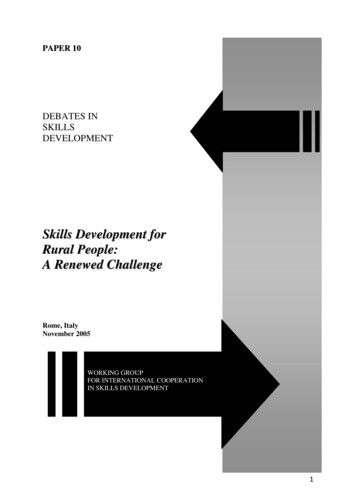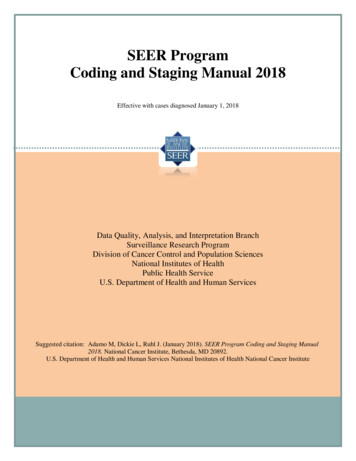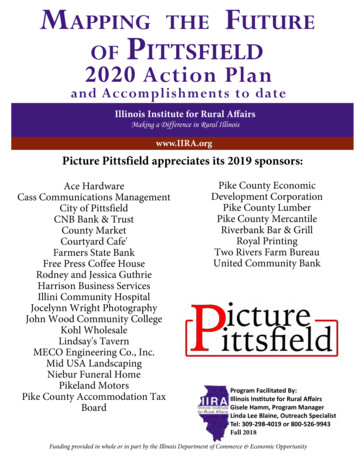
Transcription
PAPER 10DEBATES INSKILLSDEVELOPMENTSkills Development forRural People:A Renewed ChallengeRome, ItalyNovember 2005WORKING GROUPFOR INTERNATIONAL COOPERATIONIN SKILLS DEVELOPMENT1
Secretariat:International Labour Organisation, NORRAG, Swiss Agency for Development and CooperationCo-ordination:c/o Network for Policy Review Research and Advice on Education and Training (NORRAG)IUED, P.O.B. 136, CH - 1211 Geneva 21, SwitzerlandPhone: 41 22 906 59 00Fax: 41 22 906 59 94E-mail: ag.org/wg 2005 Working Group for International Co-operation in Skills Development, Geneva2
Introductionp. 5SECTION ONE: THE CHALLENGE OF RURAL SKILLSDEVELOPMENTSimon McGrathp. 6SECTION TWO: AGENCY APPROACHES TO SKILLSDEVELOPMENT FOR RURAL PEOPLE2.1.2.2.2.3.2.4.2.5.2.6.SKILLS DEVELOPMENT FOR RURAL PEOPLE:THE FAO/IIEP COLLABORATION ON EDUCATIONFOR RURAL PEOPLEMarcelino Avila, David Atchoarena and Lavinia Gasperinip. 14TRAINING FOR LOCAL ECONOMIC EMPOWERMENT:AN ILO APPROACHJosiane Captp. 20SKILLS FOR LOCAL ECONOMIC DEVELOPMENTIN CENTRAL ASIA: THE ETF APPROACHHenrik Faudelp. 24SKILLS DEVELOPMENT IN RURAL AREAS:A GERMAN PERSPECTIVEEdda Grunwaldp. 26SKILLS FOR RURAL EMPLOYMENT:A FRENCH PERSPECTIVEJean Bosco Bouyer, Pierre Debouvry and Alain Maragnanip. 29RURAL SKILLS DEVELOPMENT:A SWISS PERSPECTIVEFabienne Lagierp. 33SECTION THREE: WHO UNDERSTANDS AFRICANAGRICULTURE? TOO FEW! TOWARDS A WORLDBANK STUDYWilliam Saintp. 363
Appendix One: The programmep. 42Appendix Two: List of Participantsp. 44Appendix Three: About the Working Groupp. 494
INTRODUCTIONThis eleventh Working Group meeting was made possible by the continuedsupport of SDC to its secretariat. This particular meeting would not havebeen possible without the kind invitation of both the Food and AgricultureOrganisation and the International Institute for Educational Planning ofUNESCO. The Working Group thanks Lavinia Gasperini from FAO andDavid Atchoarena from UNESCO-IIEP for facilitating the meeting.The focus of the meeting reflected our visit to the FAO and itscollaboration with IIEP on the issue of education for rural people. We alsotook advantage of this meeting to explore the experiences of several otheragencies in this field and to discuss plans by the World Bank for newresearch in this area.The meeting was organised by the Secretariat under the leadership ofMichel Carton and was chaired by Kenneth King. This discussion paper isauthored by Simon McGrath.In addition to the inputs synthesised in this paper, a review of currentapproaches to rural skills development of bilateral and multilateralagencies, authored by Frédérique Weyer and Juliane Ineichen, is availableon the Working Group website.5
SECTION ONE:DEVELOPMENTTHECHALLENGEOFRURALSKILLSSimon McGrath1.1. The development challengeAs the subsequent papers show, there is a clear case for arguing for astronger focus on issues of rural development. This is perhaps particularlytrue in the African context, which is the main focus of some of thecontributions to this discussion paper. Furthermore, a case can also bemade relatively easily for the importance of skills development insupporting rural development.There is considerable evidence for the marginalisation of rural populationsand the incidence of poverty within rural areas. Rural people in generalare the most disadvantaged in terms of access to services, includingeducation and training, and are the worst served by infrastructure ofvarious kinds. Rural people are most likely in many settings to beamongst those who are not being reached in the drive towards theMillennium Development Goals (MDGs). Moreover, such problems aretypically starker for rural women and girls, given their multiple burdens.In spite of the pro-poor orientation of much of international and nationaldevelopment policy for more than a decade, there are ways in which thesituation of rural areas has got worse. In some cases, rural areas are themost adversely affected by HIV/AIDS. Their historical brain drain to thecities has been accelerated by the international outflow of skilled peoplefrom poorer countries.Notwithstanding the pro-poor focus, many of the problems caused bystructural adjustment are still keenly felt in rural areas. The cost of inputsand the decline of state subsidies and service delivery have made manypoorer.Specific investments in areas such as rural development and agriculturaleducation and training were reduced during the 1980s and 1990s by bothnational governments and donors in many cases. At the same time, ruraldevelopment issues easily fall through the cracks in the “joined-up”thinking of these organisations.1.2. The rationale for interventionAll of these challenges have led a range of agencies to focus specificinterventions towards the needs of the rural poor. In a number of these6
interventions, skills development has been given an important role. Thisis evident in several of the inputs that follow in this discussion paper –most notably those of FAO/UNESCO-IIEP, ILO and the World Bank.The rationale for this is multi-faceted. First, as the FAO/UNESCO-IIEPpresentation makes clear, improved skills and improved agriculturaldevelopment can work in a mutually reinforcing manner to assist with therealisation of the MDGs.Second, it is argued by some agencies that a pro-poor focus inevitablyrequires a major commitment to attacking rural poverty. This is justifiedby the size of the rural population, the incidence of poverty therein andthe stubbornness of much of this poverty. Again, for several agencies,skills development is an integral part of any strategy to address theseissues.Third, there is a more growth-oriented case made. There is considerablehistorical precedence for arguing that a rise in agricultural productivityand innovation has been a major engine of overall economic growth anddevelopment. It is argued that, particularly in Africa, there are realpossibilities for significant productivity increases that are easily achievableand are sustainable.Clearly, such a breakthrough will requireimprovements in skills and knowledge. Thus, importance is given in someaccounts (relating in particular to the World Bank presentation in sectionthree) to ways of enhancing skills, knowledge and attitudes forproductivity, innovation and diversification. Such arguments are linked torecent experiences of successful development of niche markets forSouthern produce (fruit, vegetables and cut flowers) in OECD countries,including opportunities provided by the expansion of markets for freetrade and/or organic produce.1.3. The challenge of focusReaders may have already noted some of the slipperiness of the termsthat I have been using. This highlights one of the greatest challenges inthis area: that of definition. Crucially, issues of definition here are notmere questions of semantics. Rather, they go to the heart of importantdebates about the definition of problems, target groups and intendedoutcomes.Regular readers of this discussion paper series will be attuned to the waysin which the language of skills development has evolved into new forms ofcomplexity. Similar patterns are evident in the area of rural development.In the presentations that follow and in the broader debate, there is atendency towards conflation and confusion of terms. The following tenquestions give only a flavour of this:7
Are we talking about rural populations/people or rural areas? Are we implicitly or explicitly interested in the rural poor only or dowe see rural innovators (typically wealthier farmers) as central toany strategy for rural development? Do we only consider agriculture or does rural development carrymore weight for us? If our view is agricultural, then do we want to exclude the notinsignificant numbers of urban farmers, foresters and fishers? Do we, at least implicitly, consider our target group as amarginalised and vulnerable group of aid recipients or as economicactors and change agents requiring support to enhance theirexisting skills and strategies? Where does the complexity of rural-urban migration and the role ofremittances feature in our models? How do we avoid the distorting dichotomy of thinking about farmand non-farm activities? Are we advocating a two track training system, with one focused onthe urban the formal and the other on the rural and informal? If so, are there any dangers in such a bifurcation? How do we manage the tension between a broad andcomprehensive vision of sustainable agricultural and ruraldevelopment and the need to operationalise such a visioneffectively?What is clear is that context matters very much in debating suchquestions and in responding to rural/agricultural development issues.Thus, the ETF presentation poses one more important question forcertain transition economies: what are the particular challenges in skillsfor agricultural and rural development in the context of growingimpoverishment?1.4. Strategies for skills development for agricultural and ruraldevelopmentIt is evident that much of the debate about skills development foragricultural and rural development mirrors the general skills developmentdebate, as outlined in previous volumes in this discussion paper series.8
1.4.1. Reforming public providersThe FAO/UNESCO-IIEP, ETF and World Bank contributions all reflect onthe urgent need to reform public providers of vocational and/or highereducation. The contributions mirror previous accounts about the need forreforms in public provision. The same issues are focused upon: Outmoded curricula; Lack of market-relevant short courses; The need to shift from supply-side orientations to a demand-ledfocus; Poor quality; Inadequate staff capacity; Poor infrastructure; Underfunding; Lack of institutional autonomy; Weak linkages to employers; Inadequate governance; and Unequal access.Rural location does much to increase several of these problems.Moreover, the location of many public providers under Ministries ofAgriculture is widely held to exacerbate the problem by makingagricultural education and training a backwater that is largely cut off fromthe transformation processes being experienced in systems led byMinistries of Education or Labour.1.4.2. The role of private providersIn the 1990s, ideological certainty about the superiority of the market ledto an emphasis both on the failure of public provision, as detailed above,and the need to support private provision. More recently, this position hastended to mature into one where the language is more about the fact ofthe existence of private provision and the need to develop systemicsolutions that strengthen both public and private offerings.Private provision does not receive a major focus in the discussion thatfollows. This may reflect the orthodoxy that certain forms of private9
provision struggle in rural settings due to the weakness of effectivedemand. However, what does emerge as a theme is the need to seeprivate providers as an integral part of any skills development strategy forrural and agricultural development.1.4.3. Non formal approachesWhen skills for rural development was highest on the internationaldevelopment policy agenda (some 30 years ago), there was a strongbelief in the importance of non-formal mechanisms in meeting thischallenge. Some sense of the potential role of non-formal education andtraining does emerge from the agency presentations in this volume but itis clear that NFE(T) has not yet regained its old importance, notwithstanding the emergence of the lifelong learning concept during the1990s.1.4.4. Beyond VETThe deliberations of this Working Group are an illustration of how thepredominant terminology in this field has shifted from (technical and)vocational education and training to skills development.We have previously discussed some of the advantages and disadvantagesof this shift. What is clear in the thinking about skills for agricultural andrural development is that a broad notion of skills development is beingused.The discussions of this paper note the importance of both technical andgeneric skills. Thus, it is argued by the World Bank that agriculturalgraduates need to develop skills that would prepare them for privatesector employment, such as team working and problem solving skills. TheSDC presentation is more radical, stressing the importance of developingthe political and organisational skills of farmers’ organisations.Across several of the contributions there is also a sense of the need tosupport the innovation and knowledge systems of farming/ruralcommunities. Thus, the emphasis becomes, in part, how to build onexisting skills and knowledge of communities and individuals in order thatthey can access new ways of working. Such an approach is more akin tocertain traditions in literacy and adult education than it is to the traditionalapproaches of vocational education and training.There is also much in the presentations that mirrors the recent return of acapacity agenda to the development debate. Through the efforts of theUNDP and through recent reports such as the Commission for Africa and10
Investing in Development, the need to build capacity has become a majorelement of current skills thinking. Such capacity development is seen asbeing necessary at all levels: for individual farmers and theirorganisations, for skills providers and other service organisations, fornational departments and agencies, and for international organisations.In some of the contributions, this capacity agenda is linked to othernotions such as social capital, decentralisation and participatorydevelopment.In keeping with previous Working Group papers where small enterprisedevelopment and the informal economy have been considered, there isalso a sense in some of the presentations, most clearly that of the ILO,that skills development needs to be seen in conjunction with a set of otherinputs, such as micro-credit.In a sense, this is complementary with the way that discussions aboutagricultural development have traditionally looked at the educationresearch-extension triangle. Such discussions make clear the need to seeskills development as only one part of a larger picture.This is reinforced in turn by the point that skills for agricultural and ruraldevelopment need to be supported by a positive macroeconomicenvironment and institutional framework. However, the presentations aresignificantly silent on the constraining nature of the international traderegime and the particular issue of agricultural protectionism within theOECD countries.1.4.5. The relationship to other development strategiesThe FAO/UNESCO-IIEP contribution makes most explicit mention of theneed to relate such strategies to wider development approaches. It showshow skills for agricultural and rural development can support the MDGs.It also argues for the need to insert skills issues more explicitly intoPRSPs. This has not been particularly successful to date, although the ETFpresentation does point to some regional progress in this regard.Nonetheless, there are concerns about the suitability of the PRSPapproach as a way of driving reforms of skills development.Unsurprisingly, the FAO/UNESCO-IIEP paper also emphasises theimportance of relating skills for agricultural and rural development to theEducation for All Initiative, which is under UNESCO’s leadership. Thepaper notes that the Dakar Framework for EFA goes well beyond theMDGs in stressing appropriate skills for adults and youth. Thus, skills foragricultural and rural development can be argued to be an integral part ofthe EFA approach.11
1.5. The need for lesson learningThe case for a greater focus on skills for agricultural and ruraldevelopment is a strong one. However, it is evident that such anapproach needs to take account of a range of potentially relevant lessons.First, it is necessary for agencies pushing such an agenda to consider thelessons of history. What can be learnt from the experiences of the pushtowards rural education and training in the late 1960s and early 1970s, orfrom the integrated rural development strategies of the same period?Second, what can be learnt from recent theoretical debates and practicalexperiences in OECD countries?Academic work has developed newstresses on the complexity of the concept of rurality and the centrality ofthe relationships between identity, community and learning. Equally, theEuropean Union in particular would appear to be a fertile source ofpractical experience on how rural and agricultural development strategieshave performed.Third, I have already noted the obvious parallels with existing debatesabout vocational education and training reforms and about smallenterprise and informal economy development. It is important that newrural initiatives learn some of the lessons of the long experience in theseareas.Fourth, there are a set of potential lessons from the wider debate ondevelopment. This includes considerations of how to scale up; to buildpartnerships; to promote sustainability; and to minimise dependence.Whilst there are lessons to be learnt in each of these areas, it is alsoimportant that these be seen as a starting point for explorations of howthey might play out in the particular area of skills for agricultural and ruraldevelopment and in specific national contexts.Blind acceptance ofhistorical precedent may be even more dangerous than the developmentaltendency to ignore history.1.6. Implications for agenciesEach agency will need to decide on whether and how the skills foragricultural and rural development argument speaks to their concerns.For some, it is not apparent that a rural focus adds anything to theirexisting concerns with reaching the poorest. Indeed, to the extent thatmany of this constituency are urban-located, there are agency concernsthat a predominant rural focus might be dangerous.Even for agencies that do see a need to focus in this direction, there arereal challenges.The lack of agency capacity in skills development12
discussed in our last paper is even greater when it comes to the ruraldimension of skills. Not only do few education and training experts have arural background but agricultural educationalists are also in short supplyin many agencies.Moreover, whilst it is correct to point to the weaknesses of interdepartmental coherence within agencies regarding rural issues, it is a farmore greater challenge to see what can realistically be done to build suchcoherence. Indeed, the well-charted growth of decentralisation withinagencies appears to make such coherence more difficult to ensure.Agencies may need to acquire new knowledge in this field if they are tointervene effectively. The World Bank proposal is an important step inthis direction, although there are legitimate questions about theadvisability of a sole focus on the post-secondary level. It is important forother agencies too to consider knowledge gaps in this area.The1background paper for the Rome meeting points to innovations emergingfrom newer development cooperation actors, such as Korea, China, Mexicoand Brazil. Finally, agencies need to give more consideration to thepossibilities of supporting regional activities, such as those under NEPADthat are mentioned in the World Bank paper.1Weyer, F. and Ineichen, J. 2005 “Background Document”, available on the WGICSDwebsite.13
SECTION TWO: AGENCY APPROACHESDEVELOPMENT FOR RURAL PEOPLETOSKILLS2.1. SKILLS DEVELOPMENT FOR RURAL PEOPLE: THE FAO/IIEPCOLLABORATION ON EDUCATION FOR RURAL PEOPLEMarcelino Avila, David Atchoarena and Lavinia Gasperini2.1.1. The contribution of skills development for rural people tothe MDGsOne of the strongest reasons for a focus on skills development for ruralpeople is that 70 percent of the world poor are rural. Skills development isessential to consolidate agriculture, and by strengthening the agriculturesector, progress will be made towards achieving the MDGs. The followingpoints show the potentially positive relationship between education andskills, agriculture and rural development, and the MDGs:2.1.1.1. MDG 1: Eradicate extreme poverty and hungerMuch of poverty and hunger is concentrated in rural areas. There is alsostrong evidence for the direct impact of literacy rates on hunger andpoverty. Agricultural production stimulates employment and improvesincomes.At the same time, food security positively affects labourproductivity, livelihoods and education. Thus, there is the possibility of avirtuous cycle between food security, sustainable agriculture andeducation and training.2.1.1.2.MDG 2: Achieve universal primary educationThere is a clear effect of illiteracy on poverty, food security and nutritionand vice versa. Hunger, malnutrition and food insecurity erode cognitiveabilities and reduce school attendance. Conversely, illiteracy and lack ofeducation reduce earning capacity, and contribute directly to hunger andpoverty.2.1.1.3.MDG 3: Promote gender equality and empower womenWomen’s role in agriculture, access to resources and skills is of greatimportance. Moreover, the education of girls has positive effects on14
family’ health, productivity and well being.more pronounced in rural areas.2.1.1.4.The gender gap is usuallyMDG 4: Reduce child mortalityThere is a clear negative effect of hunger, malnutrition and lack ofmicronutrients on child health and mortality.2.1.1.5. MDG 5: Improve maternal healthImproved education, the introduction of labour-saving technologies andbetter nutrition can all significantly improve maternal health.2.1.1.6. MDG 6: Combat HIV/AIDS, malaria and other diseasesImprovements in both education and nutrition can reduce the incidence ofsuch diseases and resistance to them. The protection of forests can alsocontribute as they provide a vital source of medicinal plants.2.1.1.7. MDG 7: Promote environmental sustainabilityThis can be promoted through ecologically sustainable management ofagriculture and natural resources. Moreover, it is clear that hunger andpoverty compel over-exploitation of natural resources thus compromisingenvironmental sustainability.2.1.1.8. MDG 8: Develop a global partnership for developmentA cross-sectoral focus such as that of education for rural developmentnecessarily promotes the multi-agency mobilisation of resources forachievement of the MDGs.2.1.2.2.1.2.1.Potential of agricultural systemsBenefits of agricultural growthFor the rural economy, developments in the agricultural system bringfood, jobs, incomes and services for rural people.For the national15
economy, such improvements bring food for urban people, public revenue,skilled labour for other sectors, foreign exchange, jobs, income andinvestment.2.1.2.2.Major farming systems deserve greater attentionThere needs to be greater attention paid to the major farming systems:Maize Mixed, Cereal-Root Crop, Root Crop, Forest-based and Pastoral.2.1.2.3.Major challenge of smallholdersSmallholders represent the vast majority of farmers in developingcountries. Their inherent strengths include their ability to make effectivedecisions, manage labour efficiently, optimise land productivity and adoptnew technology.However, their competitiveness is constrained inglobalised markets with stringent standards and unfair trade. Moreover,they face constraints of services, investment, technology, etc.2.1.3. Sustainable agriculture and rural developmentThe FAO/UNESCO partnership is rooted in the notion of sustainabledevelopment and the crucial role that agriculture and rural developmentplay in such framework. This had its origins in the Earth Summit (Rio)and was given further impetus by the Sustainable Development Summit(Johannesburg).The approach is centred on people’s livelihoods: what they have, theyknow, they want and they can do.The approach is beneficial because it seeks to relate this livelihoods focusto a range of factors and contexts. In particular, it considers the cultural,social, economic and environmental dimensions. It focuses on agriculture,rural enterprises and the linkages between them. It considers policy,institutions, technology and investment.Success stories for this approach at national level indicate a range ofimportant issues. First, there is a clear pay-off for having a long termvision, clear strategy and priority on development of agriculture and therural sector. Second, there are good returns on investment in humancapital and key institutions for sustainable rural development. Third,similar benefits can be had from investment in rural infrastructure (roads,health, education, communication, etc.). Fourth, the approach provides16
an effective strategy for coordinating and working with internationalcommunity.2.1.4. Participatory monitoring and evaluation systemsThis approach stresses the importance of participatory monitoring andevaluation systems (PM&E). These are designed to learn what works, todraw lessons and to share innovations. Moreover, they engender realparticipation of local communities and households.PM&E is an essential tool for using resources efficiently, leveragingcollaboration and mobilising resources from all stakeholders.PM&E encourages strengthening institutional and community capacities.It leads to the development of indicators that are meaningful to localpeople and using the information generated to assess policies, institutionsand programmes.However, there is a tendency in some projects to use the language ofPM&E because the donors like it rather than really because there is aconcern with local empowerment and democracy.2.1.5. Transformation of rural labour marketsGlobalisation is having a powerful impact of on rural labour markets.There has been a strong rise in non-farm employment and income inmany rural areas. This has been accompanied by a diversification ofemployment patterns.2.1.6. Agricultural education and training: the main limitationsConventional agricultural education and training (AET) has tended to havean excessive focus on public sector jobs and on-farm employment. Therehas been a lack of consideration for new skill areas, such as environmentand natural resource management, biotechnology, agribusiness, etc.Delivery has been fragmented, with a lack of clear learning pathways.There has been a growing lack of relationships between providers and thelabour market as the latter diversifies. There has been an excessive focuson tertiary level qualifications but a weak articulation between researchand training. Enrolment capacity remains low.17
2.1.7. The rationale for rural skills developmentRural skills development is a necessary priority for a number of reasons.In Sub-Saharan Africa in particular, the food security challenge leads to anurgent need to increase productivity. Skills will be important here.Globally, the environmental challenge leads to the need for better skillsfor protecting the environment. An economic challenge highlights theimportance of skills that can contribute to economic growth and theinternational competitiveness of the agricultural sector. There is also asocial challenge of skills development for poverty reduction, employmentgeneration and social capital creation.2.1.8. A way forward: three policy options2.1.8.1. Reforming the TVET sector in relation to rural and agriculturaldevelopmentThis approach would require a greater insertion of agriculture-related andrural development skills within TVET and higher education policies. Thisapproach assumes that TVET provision can be transformative incontributing to rural economic regeneration but also in offering a way toout-migration. It proposes TVET for rural development as a livelihoodapproach, embracing all skills for rural life rather than concentrating onagriculture education.The approach also promotes articulating TVET programmes with ruraldevelopment projects and developing a specific AET strategy.2.1.8.2. Including rural skills interventions in poverty reduction strategiesMany PRSPs make special reference to TVET as a critical component ofcapacity building. When thinking in this way, it is important to rememberthat target groups include the poor but also civil society organisations anddecentralised levels of government.Targeted sectors go beyondeducation to institutional, social and economic dimensions. However, onlysome PRSPs mention reform of TVET sector.2.1.8.3. Broadening the EFA agenda to include programmes for ruralyouth and adultsNational EFA Action Plan focus on school education, in particular UPE. Asa result, the needs of out-of-school youth are overlooked. This is worst in18
the case of rural youth. However, goals 3 and 4 of the Dakar Frameworkrelate to skills development for rural youth and adults:Goal 3 : Ensuring that learning needs of all young people andadults are met through equitable access to appropriate learningand life skills programmes ; andGoal 4 : Increasing adult literacyThere is a need to promote skills development for rural people. Thisshould focus on the development of capacity for learning, innovation andproductivity. It should be based on a view that skills are more than justnarrow technical competencies. Rather, a view of skills is needs that alsoincludes interpersonal, communication, teamwork and creative skills.2.1.9. The Education for Rural People FlagshipThe ERP is a partnership launched at the Johannesburg Summit thatbridges the agriculture and education sectors and the concerns of theWorld Food Summit and the Education for All initiative. It is conceived ofin the spirit of MDG 8.2.1.9.1. ERP objectivesThe ERP seeks to strengthen the capacity of Ministries of Education andAgriculture to Formulate adequate policies to address education needs of rural poor Improve quality and relevance of curriculum Ensure full participation of NGOs and private sector Mobilise donor support2.1.9.2. Main resultsThe ERP partnership has led to new alliances among more than 200partners including governments, agencies and civil society organisations.It has been integrated into nationa
DEVELOPMENT FOR RURAL PEOPLE 2.1. SKILLS DEVELOPMENT FOR RURAL PEOPLE: THE FAO/IIEP COLLABORATION ON EDUCATION FOR RURAL PEOPLE Marcelino Avila, David Atchoarena and Lavinia Gasperini p. 14 2.2. TRAINING FOR LOCAL ECONOMIC EMPOWERMENT: AN ILO APPROACH Josiane Capt p. 20 2.3.










